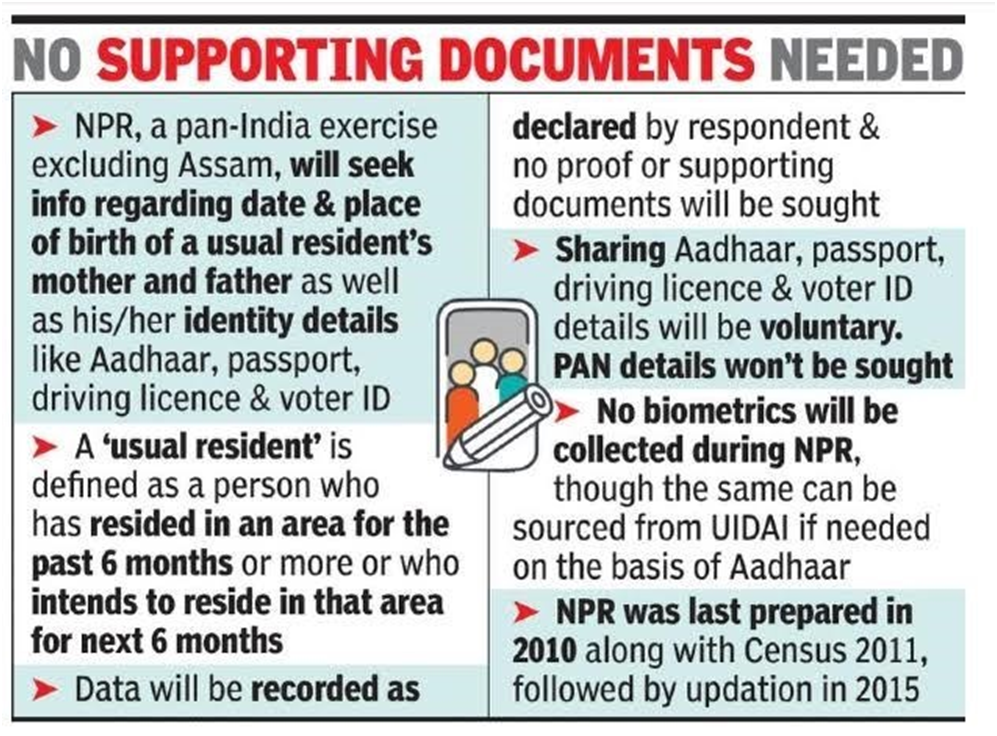CURRENT AFFAIRS
Get the most updated and recent current affair content on Padhaikaro.com
Census and NPR
- IAS NEXT, Lucknow
- 04, Jan 2022

Mandatory requirements for Census:
Freezing of boundary limits of administrative units: Freezing of boundary limits of administrative units (boundaries of districts, sub-districts, tehsils, talukas, police stations etc.), at least three months prior, is a pre-requisite for conducting the census.
- For Census 2021, all the changes between January 1, 2010 i.e. after the date of freezing of boundaries for Census 2011 up to the date of freezing of boundaries for forthcoming exercise (presently up to June 30, 2022) are to be considered for finalising the administrative units.
Census:
The census provides information on size, distribution and socio-economic, demographic and other characteristics of the country’s population.
- The Census was first started under British Viceroy Lord Mayo in 1872. It helped in framing new policies, government programs to uplift areas of improvement in the community.
- The first synchronous census in India was held in 1881. Since then, censuses have been undertaken uninterruptedly once every ten years.
Who conducts census?
The responsibility of conducting the decennial Census rests with the Office of the Registrar General and Census Commissioner, India under the Ministry of Home Affairs, Government of India.
The Census is one of the most credible sources of information on the following:
- Demography.
- Economic Activity.
- Literacy and Education.
- Housing & Household Amenities.
- Urbanization, Fertility, and Mortality.
- Scheduled Castes and Scheduled Tribes.
- Language.
Historical Significance:
- ‘Rig-Veda‘ reveals that some kind of population count was maintained during 800-600 BC in India.
- Arthashastra by ‘Kautilya’ written in the 3rd Century BC prescribed the collection of population statistics as a measure of state policy for taxation.
- During the regime of the Mughal king Akbar, the administrative report ‘Ain-e-Akbari‘ included comprehensive data pertaining to population, industry, wealth and many other characteristics.

How is NPR different from Census?
The objective of the NPR is to create a comprehensive identity database of every usual resident in the country and it is “mandatory for every usual resident of India to register in the NPR.”
While similar data is collected through Census, according to Section 15 of the Census Act, 1948, all individual level information collected in Census is confidential and “only aggregated data are released at various administrative levels.”
- The NPR was first compiled in 2010 and updated in 2015 and it already has a database of 119 crore residents.
Who is a usual resident?
A usual resident is defined for the purposes of NPR as a person who has resided in a local area for the past 6 months or more or a person who intends to reside in that area for the next 6 months or more.
Criticisms surrounding NPR:
Many Opposition-ruled States have opposed the updation of the NPR due to its link with the proposed National Register of Citizens (NRC) and the Citizenship Amendment Act (CAA).
- According to Citizenship Rules framed in the year 2003, NPR is the first step towards compilation of National Register of Indian Citizens (NRIC) or NRC.